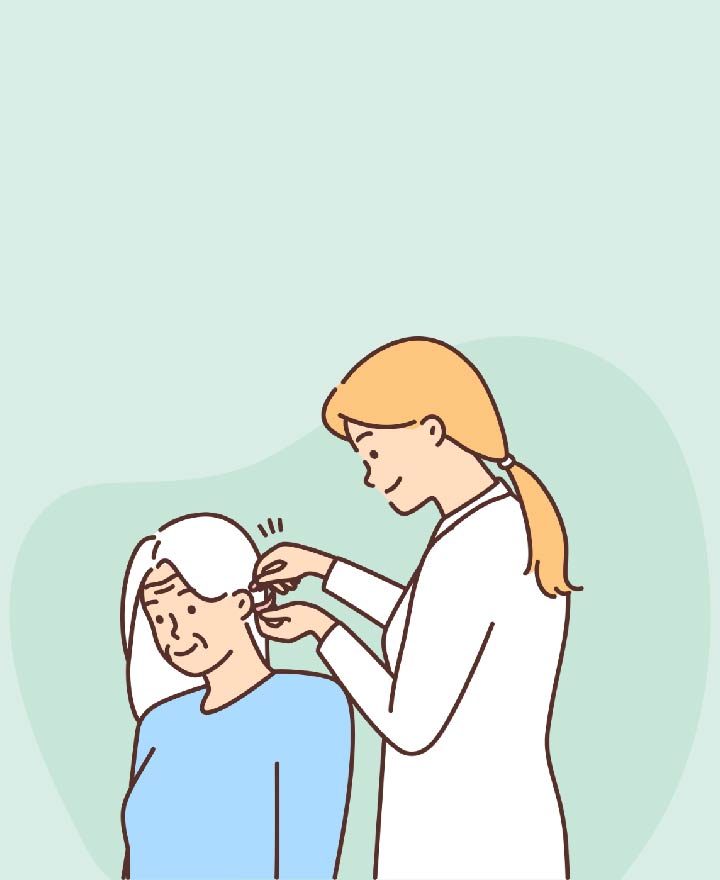

Age-Related Hearing Loss - Cause & Symptoms
Age-related hearing loss also known as Presbycusis affects around half of the population over the age of 75. While this condition cannot be reversed, there is treatment options available which can help enhance hearing ability and improve the quality of life. Read on to know about causes and symptoms you must watch out for so that you can seek for right treatment at the right time.
Causes of Age-Related Hearing Loss
A combination of lifestyle, genetic, and environmental factors gradually wear down your ears' delicate mechanics.
Factors that cause Hearing Loss
This includes:
● Exposure to loud noises
● Use of certain medications such as chemotherapy drugs, aspirin, malaria drugs, etc.
● Diabetes, heart disease, and high blood pressure
● Trauma
● Infection or ear wax
● Impairment in the nerves responsible for hearing
● Changes in the structures of the inner ear
● Changes in the blood flow to the ear
● Smoking
Symptoms of Age-Related Hearing Loss
Hearing loss often develops slowly over time, so you may not know that you have a problem. As long as you can hear some sounds, you think that your hearing is fine. Symptoms of age-related hearing loss often begin with difficulty hearing high-pitched sounds and vary depending on the degree of hearing loss.
Levels of Hearing Loss
This includes:
● Mild Hearing Loss – Difficulty in understanding conversations when there is background noise.
● Moderate Hearing Loss – You may ask people to repeat conversations in person and on the phone, even in quiet situations.
● Severe Hearing Loss – Hearing becomes very difficult without a hearing aid.
● Profound Hearing Loss – Hearing and understanding conversations is nearly impossible. Even hearing aids and other assistive listening devices may not completely restore hearing.
Other Symptoms
You may experience other symptoms, such as:
● Difficulty following a conversation when more than one person speaks.
● Increasing the volume of the TV or radio beyond normal.
● Ringing, hissing, or roaring sounds in your ears.
● Difficulty hearing the voice of children or females.
● Certain sounds seem extremely loud.
Conclusion
Age-related hearing loss is common in the elderly and is caused by a variety of genetic, medical and environmental factors. Understanding how presbycusis develops can help you work with your doctor to minimize hearing loss and improve your quality of life as you get older.
One of the important components of our overall wellness is also being financially secured. Healthcare emergencies can happen any time, but a good health insurance can protect you from such uncertain situations. To know more about it, click here
Source: Healthline, NIDCD, Cleveland Clinic, Hear, Webmd, Hoffmannaudiology
Disclaimer: This blog provides general information and discussions about health and related subjects. The information and other content provided in this blog, website or in any linked materials are not intended and should not be considered, or used as a substitute for, medical advice, diagnosis or treatment. Kindly contact your Doctor before starting a new medicine or health regime.
Related Articles
Common Old Age Problems – Causes & How To Control Them
Staying Strong Post 60 - Why Strength Training Is Vital For Seniors
How To Assist Adults With Eating And Drinking
Complete guide to senior citizen health insurance policy
Save Tax with Senior Citizen Health Insurance under Section 80D
Published on December 27, 2022














 Health Insurance
Health Insurance  Travel Insurance
Travel Insurance  Car Insurance
Car Insurance  Cyber Insurance
Cyber Insurance  Critical Illness Insurance
Critical Illness Insurance
 Pet Insurance
Pet Insurance
 Bike/Two Wheeler Insurance
Bike/Two Wheeler Insurance  Home Insurance
Home Insurance  Third Party Vehicle Ins.
Third Party Vehicle Ins.  Tractor Insurance
Tractor Insurance  Goods Carrying Vehicle Ins.
Goods Carrying Vehicle Ins.  Passenger Carrying Vehicle Ins.
Passenger Carrying Vehicle Ins.  Compulsory Personal Accident Insurance
Compulsory Personal Accident Insurance  Travel Insurance
Travel Insurance  Rural
Rural